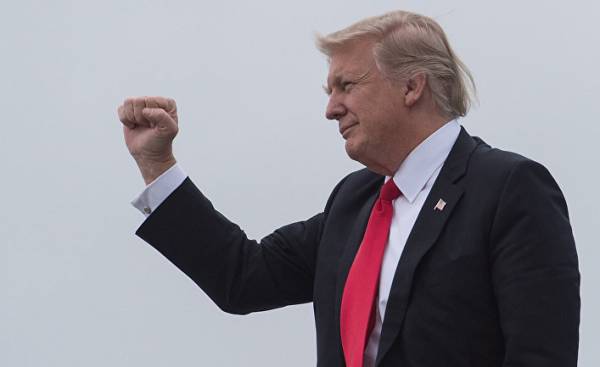
“America first” — blows Donald trump. “Britain first” — say the supporters of Breccia. “France above all,” shouts marine Le Pen and her national front. “Russia above all”, declares the Kremlin of Vladimir Putin. Against this background of attention to the issue of national sovereignty globalization looks today doomed.
This is not so. Today is not a fight globalism and antiglobalism. The world was in the center of the rivalry between the two integration models. One model is based on the principles of internationalism and multilateralism (multilateralism) and the second on imperialism and bilateral relations (bilateralism). The world fluctuates between throughout modern history.
Since 1945, internationalists dominated. They advocated cooperation and multilateral institutions that promote the creation of global public goods — peace, security, financial stability, environmental sustainability. Their model restricts national sovereignty by forcing States to abide by common norms, conventions and treaties.
In 2016, the scales are tipped in the direction of bilateralist who think national sovereignty is an end in itself. The less external constraints, the better: peace and security arise as a result of the balance between the great powers. Their model encourages strong and punishes the weak, it encourages competition at the expense of cooperation.
For most of the nineteenth century, the integration process was a hybrid of internationalism with imperialism. Free trade became dogma, the mass migration was encouraged, and the state has taken a new, global norms, for example, in 1864, signed the First Geneva Convention regarding the care of patients and wounded on the battlefield. But the globalizers could be predators: the Nanjing Treaty of 1842 between Britain and China conquered the Median Empire to the West. The most disgusting manifestation of bilateral imperialism was the division of Africa between the Europeans on the exclusive possession.
In the most terrible period of human history dominated bilateralism. In the years 1914-1945 the desire for national greatness was the cause of the destructive economic competition and mass violence. The collapse of wall street in 1929, finally crippled the international order, which is already hardly holding on. One after another, the country went into isolation; by 1933, the volume of world trade fell to one-third of the 1929 level.
Fueled by racism and fears of overpopulation, the globalization has become predatory: powerful countries to impose the neighbors and partners of unequal trade agreements, or simply seized them. In 1931 Japan had their eye on Manchuria, decided to create a puppet state, and in 1937 invaded China. In the same spirit the Soviet Union acted in the middle of the Russian community abroad. The Nazis forced some weak neighbors to the signing of the imposed agreements, and others — occupied; their goal was the devastation of the Slavic lands, to open the way for the Teutonic settlers.
In 1941, the brutality of bilateralism forced the US President Franklin Delano Roosevelt and British Prime Minister Winston Churchill to create the Atlantic Charter. In this respect, the postwar declared that freedom is the cornerstone of a peaceful life and that bilateralism to be curbed. No more grips. No more blackmail, duties. Freedom of the seas.
The result of the Atlantic Charter and the allied victory in world war II became a “Global new deal”: agreeing on international rules and institutions, States could participate in the post-war economic boom. In the center of this experiment with globalism on the basis of multilateral principles (multilateralism) has been European integration. After the reconciliation of France and Germany, Europe was a zone of chronic conflict, has become a region of an exemplary cooperation.
Limitation of national sovereignty has helped to ensure post-war prosperity, thanks to global trade, investment and migration. Billions of people out of poverty. Remained a relatively peaceful situation.
But, it seems that the “Global new deal” has exhausted itself. Too many people believe that the world is a messy, risky, disappointing and dangerous. It is the opposite of what was intended by the authors of the Atlantic Charter. Since 1980 the global integration began to be accompanied by increasing inequality within countries. Although for the educated cosmopolitan in big cities, opportunities have expanded, the relationships among citizens within countries began to weaken as it began to dismantle the national social contracts.
Global differences were blurred, and this is only exacerbated internal divisions. Thus arose the conditions for a hurricane to return to the scene of bilateralist. On the flanks of leaders like Russian President Vladimir Putin, longed for a return to peace with the sovereignty of muscles, tenderness was not confined to multilateralism. And now they have the company and in key countries.
Two days after his inauguration, trump said that the United States will be “a new chance” to capture Iraqi oil. He then led the United States out of the trade agreement the TRANS-Pacific partnership, and also promised to renegotiate the North American free trade agreement (NAFTA). Future signed so hard the Paris climate agreement is now under question. Meanwhile, Britain gave the world free trade in the 1840’s, decided to develop alone. As a result, the old allies of the Atlantic Charter had put national sovereignty above global public goods.
Now the world’s attention is riveted to France and the upcoming presidential elections there. At stake is the normal work of the Franco-German engine driving forward European integration, which was the center of all the postwar multilateral system. The victory of Le Pen in early may could spell doom for the EU. In this case, the Chancellor of Germany Angela Merkel will remain the last Bastion of a crumbling world order. A country that since 1945 most of all changed due to internationalism, will become its last Bastion, surrounded by bilaterality France, Britain, Russia, the main patron of the country — the USA — is in the hands of nativists.
Imagine this scene: a few weeks after the victory of Le Pen, the leaders of the “Big seven” gathered in sparkling gold hotel in Taormina, Sicily. USA and Canada are arguing over NAFTA. UK squabble with France and Germany because of Brexia. Japan staggers after the collapse of the TTP. And while they all turned back to their global commitments in the surrounding Sicily the waves drown the refugees that broke their fragile court — epitaph to the bygone era.







